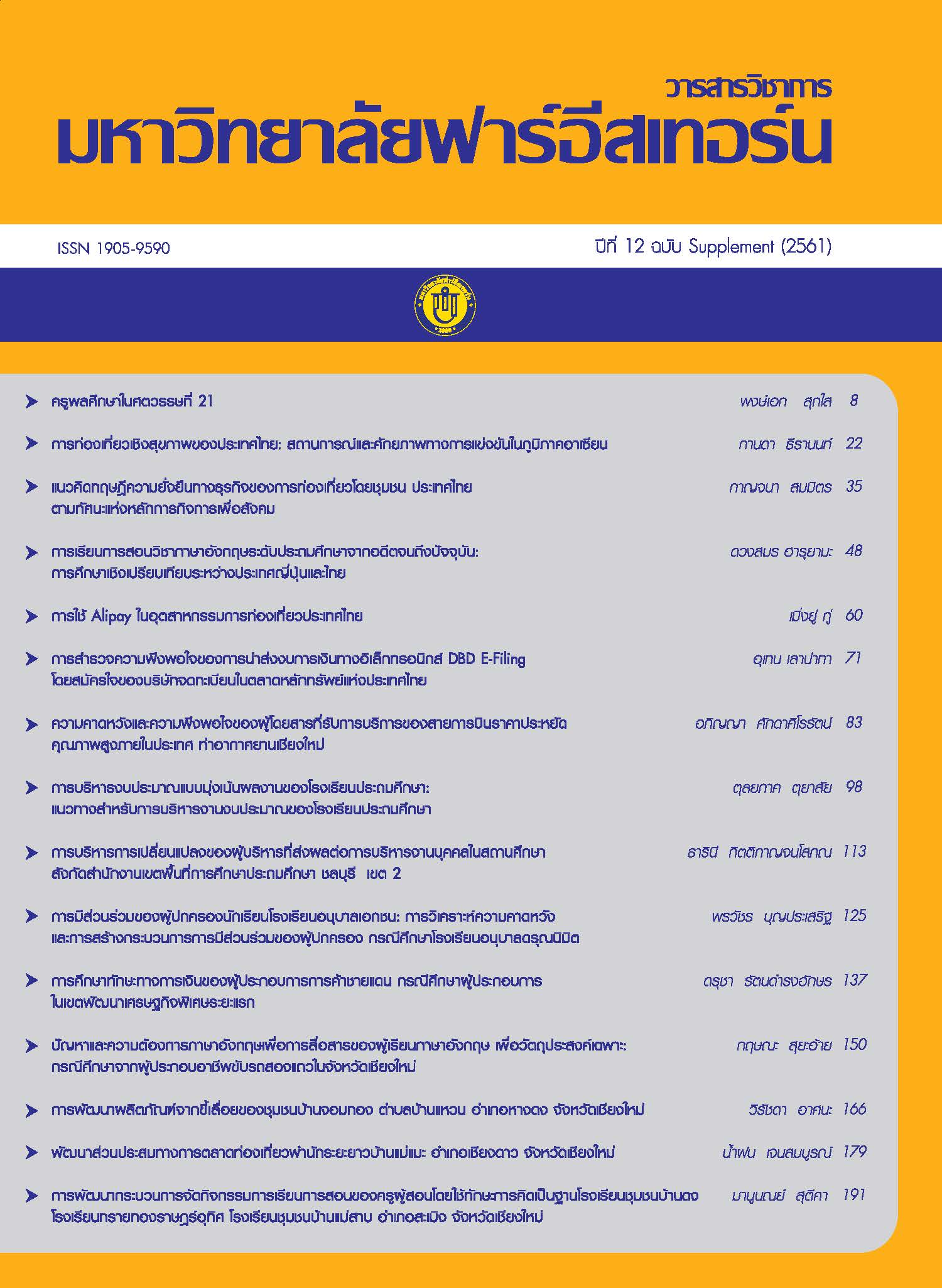Using Alipay in Thailand Tourism Industry การใช้ Alipay ในอุตสาหกรรมการท่องเที่ยวประเทศไทย
Main Article Content
Abstract
With the development of China's economy and internet technology, when more and more Chinese tourists visit to Thailand, China's smart phone payment systems start to grow on Thai people. Alipay, the most well-known third-party online payment in China, as a safe, fast and convenient online payment platform, is widely recognized and accepted by the people. It is not only Chinese tourists who have used to use Alipay online payment systems in China, but also Thai people who dealing with Chinese tourists frequently. This paper conducted a study on Alipay using in Thailand, especially in Chiang Mai. First of all, this paper introduces the profile of Alipay payment system, describes its development and market environment. Secondly, this paper analyzes the status of using Alipay in the development of Thai tourism industry. Thirdly, this paper also points out the problems and limitations of using Alipay in Thailand.
ด้วยการพัฒนาเศรษฐกิจและเทคโนโลยีอินเทอร์เน็ตของประเทศจีน และมีนักท่องเที่ยวชาวจีนเข้ามาเที่ยวในประเทศไทยมากขึ้น ระบบการชำระเงินออนไลน์ของจีนจึงเริ่มเติบโตขึ้นในประเทศไทย Alipay เป็นระบบการชำระเงินออนไลน์ผ่านฝ่ายที่สามที่มีชื่อเสียงมากที่สุดในประเทศจีนและก็เป็นระบบการชำระเงินออนไลน์ที่มีความปลอดภัย ความรวดเร็วและความสะดวกสบายจึงได้รับความนิยมและการยอมรับจากประชาชนเป็นอย่างดี คนที่นิยมใช้ระบบการชำระเงินออนไลน์ของ Alipay ไม่เพียงแต่เฉพาะนักท่องเที่ยวชาวจีนเท่านั้น แต่ยังรวมถึงคนไทยที่ติดต่อกับนักท่องเที่ยวชาวจีน ในบทความนี้ได้นาเสนอการศึกษาเกี่ยวกับ Alipay ในประเทศไทย โดยเฉพาะในจังหวัดเชียงใหม่ บทความนี้แบ่งการนำเสนอออกเป็น 3 ประเด็นโดยประเด็นแรก เป็นการเสนอข้อมูลโดยย่อ (Profile) และอธิบายการพัฒนาและสภาพแวดล้อมทางการตลาดของระบบการชำระเงินของ Alipay ประเด็นที่สองเป็นการวิเคราะห์สถานการณ์ใช้ Alipay ในการพัฒนาอุตสาหกรรมการท่องเที่ยวในประเทศไทย นอกจากนี้บทความนี้ยังบ่งชัดปัญหาและข้อจำกัดของการใช้ Alipay ในประเทศไทย
Article Details
1. Any views and comments in the Journal of Social Innovation and Lifelong Learning are the authors’ views. The editorial staff have not to agree with those views and it is not considered as the editorial’s responsibility.
2. The responsibility of content and draft check of each article belongs to each author. In case, there is any lawsuit about copyright infringement. It is considered as the authors’ sole responsibility.
3. The article copyright belonging to the authors and The Far Eastern University are copyrighted legally. Republication must be received direct permission from the authors and The Far Eastern University in written form.
References
Globaltimes. (2016). Chinese Tourists Continue to Flock to Thailand. Retrieved 1August 2017, from https://www.globaltimes.cn/content/998025.shtml.
Guo Jun & Noor IsmawatiJaafar. (2011).A Study on Consumers’ Attitude towards Online Shopping in China. International Journal of Business and Social Science.Vol. 2 No. 22; December 2011, 122-132.
Huang Xueling. (2015). The Analysis of Influence of Alipay Platform on State-owned Commercial Banks. Journal of Regional Financial Research. No.1, 2015. General No. 506
Jeyashoke, N., Vongterapak, B. & Long Y. (2014). Does Culture Matter? A Case Study on Online Retailing Stores across Three Asian Countries. Allen Institute for Artificial Intelligence
Korawan, S. (2013).Modern Chinese Tourists’ Behavior in Chiang Mai after the Movie “Lost in Thailand”.Conference: The Second Sino-Thai Strategic Research Seminar 2013, At Xiamen, China.
Liu Rongbing. (2015).The Role of Alipay in China.Netherlands: Faculty of Science, Radboud University.
Napas Jeyashoke, Boonyluck Vongterapak & Yoanna Long. (2013). Does Culture Matter? A Case Study on Online Retailing Stores across Three Asian Countries. Hasan School of Business, Colorado State University Pueblo, CO. USA.
Mary, M. & Tanya, P. (2016). “Lost in Thailand”: the Popular Geopolitics of Film-induced Tourism in Northern Thailand. Social & Cultural Geography.
Samuitimes. (2017). Four million Chinese tourists set to visit Thailand this year. Retrieved 1August 2017, from https://www.samuitimes.com/four-million-chinese-tourists-set-visit-thailand-year/.
Sasitorn Chetanont. (2015). Chinese Tourist’s Behaviors towards Travel and Shopping in Bangkok. World Academy of Science, Engineering and Technology International Journal of Social, Behavioral, Educational, Economic, Business and Industrial Engineering Vol: 9, No: 5, 2015
Song Chengjie, Pithoon Thanabordeekij. (2016).The Customer Expectation and Perception of Alipay in Guangdong, China.การประชุมวิชาการระดับชาติปัญญาภิวัฒน์ ครั้งที่ 6 29 กรกฎาคม 2559 สถาบันการจัดการปัญญาภิวัฒน์
Song Lifang. (2017). Mobile Payment with Alipay, Wechat Becomes New Trend around World. Retrieved 20 October 2017, from https://www.news.xinhuanet.com/english/2017-05/08c_136266288_8.htm.
Wong Tak Yan & Yeung Yuen Ha. (2011).Trust and Purchase Intention towards Taobao's Alipay (China online market place).An Honours Degree Project Submitted to the School of Business in Partial Fulfilment of Graduation Requirement for the Degree program of Bachelor of Business Administration (Honours) in the academic year of 2010 to 2011.

